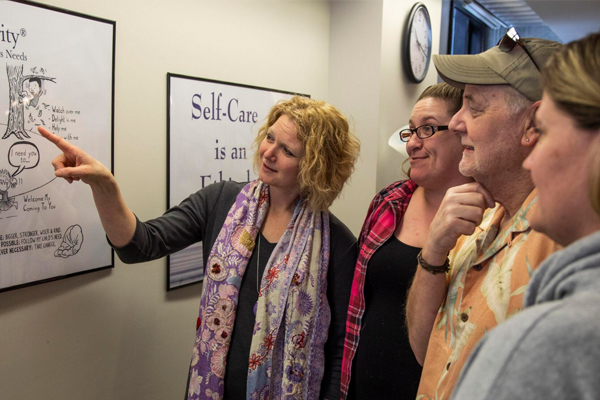Training to heal with hearts and minds
COCC's addiction studies program combines clinical experience and close-knit training for a rewarding, in-demand career.
By Mark Russell Johnson - Aug 1, 2021
Carlos Vazquez was hurtling down a treacherous road. Just eight years ago, before enrolling in Central Oregon Community College's addiction studies program, that road seemed endless. "My life revolved around addiction, jail, prison, mental health problems and a terrible misunderstanding about myself and who I was," he shared.
But he made his way to sobriety, and though he struggled with some depression and was burdened by back-to-school fears, Vazquez decided to begin anew, and to learn to help others. So he started up at COCC, began to shape a healthier life in the process — earning a COCC Foundation scholarship and receiving the school's diversity achievement award along the way — soon finding the turning power that he needed.
"Monica Vines [program director and professor] provided a safe, inclusive learning environment and modeled what trauma-informed care should look like," said Vazquez, now a community health worker for Providence Sacred Heart Medical Center in Spokane. The COCC grad also serves on the oversight and accountability council of Oregon's recently passed Drug Addiction Treatment and Recovery Act, or Measure 110, contributing to the state's large-scale shift from drug criminalization to treatment and recovery. "The education I received has opened so many doors in my life, beyond my wildest dreams," he added.
Teaching students to support and counsel others is the focus of the addiction studies and human services discipline at COCC, a program that began in 2001 and combines a tight-knit atmosphere with immersion in clinical settings. Students learn required skills and strategies to help others, but also condition themselves on coping with an emotionally demanding career.
Three academic tracks are offered: a two-year certificate, an associate degree and a transfer degree. It's an "open" program, so newly enrolled students can start any term.
The certificate covers 300 of the required 1,000 hours of on-the-job training for professional certification and readies graduates to sit for the state's tier-1 Certified Alcohol Drug Counselor (CADC) exam. It's a level that preps counselors to facilitate recovery groups. With an additional term of schooling, adding in more practicum experience, students can earn an Associate of Applied Science degree and take Oregon's CADC-II exam, a credential that enables them to supervise others in the field.
The Associate of Arts Oregon Transfer degree, a general degree with a focus on human services, is also oriented toward CADC-II capability but modeled with all the necessary coursework to continue with a bachelor's degree or advanced studies.
Sarah Wiggers, who spent a number of years in the culinary industry where she saw a fair amount of workplace substance abuse — along with witnessing some substance abuse that struck a little closer to home — sought to make a difference, "to empower people."
Wiggers began with the COCC addiction studies program in 2016, went on to earn a bachelor's degree in social work at Portland State University and is now a master's candidate in the same program while working as a counselor for BestCare Treatment Services. "COCC has been an invaluable investment in my future," she expressed. "It was engaging, challenging and prepared me to excel as a student and clinician…providing me with a rewarding career path."
"If students are unsure, I map out the pathways with them," explained Monica Vines, program director. "This is a place where students can assess whether they want to focus on the clinical side of things." To aid with the mapping process, she said, students have an early-on assignment that requires interviewing and writing about someone already working in the field, to train a focus on everything from work demands and weekly schedule to job intensity and salary.
When it comes to salary, Oregon's average in the field of substance abuse counselors currently ranks fifth in the nation, at $59,800, according to the U.S. Bureau of Labor Statistics. Growth for the sector is expected to surge nationwide by 25% between 2019 and 2029, and Oregon is no exception: In Grants Pass, for instance, the concentration of substance abuse counselor jobs per overall jobs ranked seventh in the country.
The pandemic has only exacerbated that need. With imposed isolation and a multitude of health and economic stressors, the pandemic has amplified challenges for those in recovery or facing abuse issues — who number some 20 million Americans, according to a recent National Survey on Drug Use and Health.
"I think the long-term repercussions of COVID-19 and the continuing population growth of Central Oregon make this area of study more critical than ever," said Danielle Nye, a student in the program who recently completed volunteer training at Saving Grace and serves as a volunteer with Deschutes County for COVID-related issues. Nye is inspired to meet the challenge. "I have never worked with classmates that have been so driven to make a difference in their community than the students in the human services and addiction studies program."
For more details, visit cocc.edu or call 541-383-7700.

